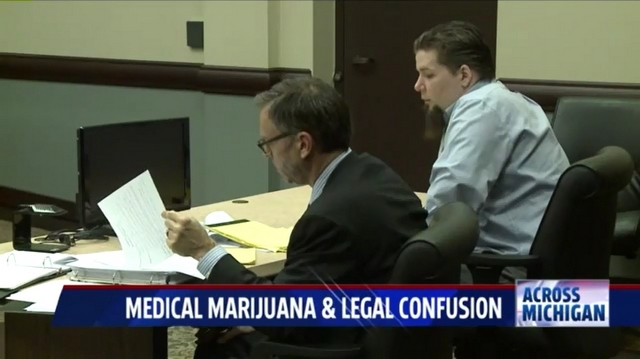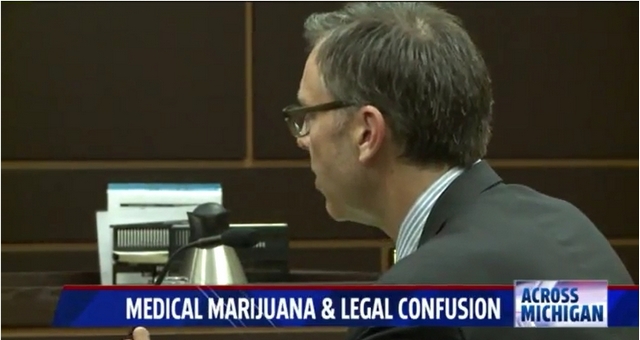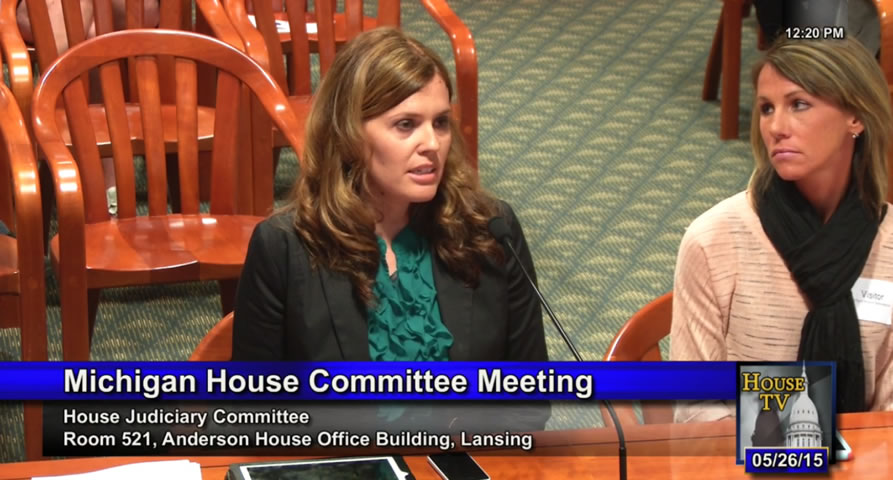
Aug 12, 2015 | Criminal Defense Attorney Michael Komorn, Komorn Law Blog, Marijuana Criminal Defense Attorney Michael Komorn, Medical Marijuana Attorney Michael Komorn
April 23, 2015 – In Western Michigan yet another Michigan Medical Marijuana patient is fighting for his freedom in a system of confusing laws. He is also fighting for the right to see his child all while the State of Michigan possibly destroys his family and financial future. Max Lorincz -unlike most who plead to the sometimes bullying tactics of the court system – is standing up for his right use the medicine recommended by a doctor.
The fly in the ointment in this case is that the marijuana was a concentrate and not what is described as usable in the Michigan Medical Marihuana Act.
The story has been covered by the Fox 17 News program. Below is some further information from the online website.

GRAND RAPIDS, Mich. – A Spring Lake father already served jail time and is due back in court for another felony charge of medical marijuana concentrates possession, despite having a medical marijuana card.
Max Lorincz told FOX 17 has suffered years of pain from a long list of ailments, including herniated back discs and severe celiac disease. Yet when he started to use prescribed medical marijuana edibles and concentrates, his pain faded.
Here’s the hook: even though Lorincz has a medical marijuana card and thought he was following the law, marijuana concentrates are not necessarily protected under the Michigan Medical Marijuana Act.
“When I got on the edibles, it was able to calm my stomach down enough and get things under control better than any medications they’d prescribe me,” said Lorincz.
Recently Lorincz was charged with felony marijuana concentrates possession. As he awaits court, the judge ordered him to be drug tested. Now he said he is forced back on powerful painkillers; pills Lorincz said make him feel like a zombie.
Under the current Michigan Medical Marijuana Act, “usable marijuana” is defined only as the dry leaves or dry flowers of the plant. Under its section four, users are protected to have up to 2.5 ounces of “usable marijuana,” Concentrates are not and according to the People v. Carruthers, don’t qualify for section 4 immunity.
Medical marijuana users can find defenses under section 8 of the act when they meet certain criteria. Prosecuting status quo tactics are usually stripping a defendant of their section 4 and section 8 immunity by any means therefore disallowing any reference of medical marijuana in a trial to a jury.
There is legislation pending that would amend the Michigan Medical Marijuana Act to include perhaps a more specific definition of “usable marijuana.” However, this House Bill 5104 has been hung up for months, after the Michigan Senate referred it to a committee last August.
Since seeing FOX 17’s coverage of Lorincz’s case back in February, Defense Attorney and President of the Michigan Medical Marijuana Association Michael Komorn took on Lorincz’s case pro bono. For the last six years, Komorn said he’s dedicated his practice exclusively to medical marijuana patient and caregiver representation.

But his case has come with some devastating consequences. In February Lorincz was charged with a two-year felony: possession of a schedule 1, controlled, synthetic substance. Schedule 1 is defined as a controlled substance that has no medical use.
Now his five-year-old son is taken away, and he is left with only supervised visits. All of this because Lorincz called 911 in September for a family medical emergency. The deputy who responded to the call found a smear of butane hash oil in his home. It’s a substance Lorincz ingests for what he called “deep pain relief,” and is something he obtained with his medical marijuana card.

“I’m outraged by it, it shouldn’t have happened,” said Komorn.
Komorn said medical marijuana is not a controlled substance. In fact, Michigan law states marijuana is a schedule 2 drug. Yet because Lorincz is charged with having a schedule 1 drug, and not specifically marijuana, Komorn said it is difficult to protect Lorincz under section 8 immunity of the Michigan Medical Marijuana Act.
Komorn believed part of the issue is a recent policy change in Michigan State Police Lab reporting.
“They had a policy change by why?” asked Komorn. “The policy changed. The motivation for it was if they report it this way, people like Max won’t be able to claim a medical marijuana defense.”
The lab technician in Lorincz’s case testified that he has been testing tetrahydrocannabinol, or THC, for 25 years. THC is the main psychoactive ingredient in marijuana, also present in synthetics. However, a recent policy change means the technicians have to write “origin unknown” when testing this type of THC on lab reports. The technician said he could not tell if the sample was synthetic or natural.
The prosecution argued Lorincz’s residue was not “usable marijuana,” as defined in the previous court case, People versus Carruthers; therefore, Lorincz should be bound over for trial. However, Komorn argued that a hash extraction comes directly from the resin of the plant.
Komorn said this lab policy change is the difference between a felony and no charge at all for Lorincz, stating he should be protected under the Michigan Medical Marijuana Act. Komorn asked the judge to dismiss it.
“(The lab technician) admitted that on the stand,” said Komorn. “That is very, very, very disturbing to me, because it means that the politics in the law are affecting the truth. That’s not how it’s supposed to be. We’re supposed to rely on science to make the case.”
For now Lorincz said he is following court’s orders and is back to taking what he calls debilitating prescription pain-killers.
Read More Detail From Fox 17 The Report Here
Also Check This Out
Prescription Pain Killers – Deaths Fall In States With Medical Marijuana

Aug 6, 2015 | Blog, Criminal Defense Attorney Michael Komorn, Medical Marijuana, Medical Marijuana Attorney Michael Komorn, Michigan Medical Marijuana Criminal Defense, News
Aug 5, 2015 – After a year long battle, Michigan Attorney Michael Komorn and his staff have chalked up another positive conclusion for a client caught up in the medical marijuana and forfeiture debacle.
Some may consider it a win, but this slow ruination of a family like so many other Michiganders… should most likely have never occurred.
What’s left to do after this… is to put the shattered pieces back together, emotionally, physically and financially. Then hope the children can go on and forget this ever happened.
The story’s beginning of the end starts here… Read on and you will find out how it began.
The Beginning of the End: Prosecutors drop marijuana charges against Michigan mom.
Prosecutors have dropped marijuana charges and will return items seized from a woman in the wake of a Michigan Supreme Court ruling last week.
“I’m elated that this part is over,” said Ginnifer Hency. “…It’s been a long year.”
St. Clair County Prosecutor Michael Wendling said about 18 cases were on hold while prosecution and defense waited on the Supreme Court decision.
“We reevaluated the files that we had pending and at least five were no longer viable in light of the Supreme Court decision,” Wendling said.
“I think that’s an analysis that prosecutors across the state are undertaking.”
The Supreme Court ruling last week clarified when caregivers and users can use their medical marijuana certification as a defense or immunity if charged with a marijuana-related crime. It was the court’s ninth medical marijuana ruling since voters approved the Michigan Medical Marijuana Act in 2008.
“We would have to have specific evidence on those items in order to overcome that burden now that we did not have to show before,” Wendling said.
Wendling said any unresolved civil forfeiture cases connected to those five dismissed cases also will be dismissed, and items seized will be returned.
The Free Press in February reported that police seized more than $24 million in assets from Michiganders in 2013. In many cases the citizens were never charged but lost their property anyway.
Komorn said Hency was arrested and her home raided in July 2014. The medical marijuana caregiver was charged in December 2014 with possession with intent to deliver marijuana.
According to appeal documents from the prosecution, Hency told a Drug Task Force member she had six ounces of marijuana in a locked bag that she intended to exchange for a different strain with another caregiver and give the marijuana to her patients.
Her case was dismissed by visiting District Judge David Nicholson in May after Nicholson found that no crime had occurred.
The prosecutor’s office appealed in circuit court. Oral arguments on the appeal were supposed to be heard by Circuit Judge Michael West Wednesday.
Hency’s lawyer, Michael Komorn hailed the dismissal.
“But that does not eliminate the horror of what they’ve had to deal with the last year,” Komorn said.
“It didn’t come easy. We’ve had to fight for a year.”
Komorn said Hency’s family was devastated by the July 2014 raid on their home and Hency has had trouble finding employment because of the pending narcotics charge.
Hency said authorities seized several items, including a Chevy Impala, two iPhones, an iPad and a ladder, when they raided her home in 2014. The mother of four, who has multiple sclerosis, told Forbes Magazine that they even took her sex toy.
Hency said she appreciated the prosecutor’s decision to dismiss the case “in the interest of justice.” But she said she feels her case isn’t completely finished.
“When I get my stuff back I will consider it over,” Hency said.
From the beginning of the end to when it started
(you should start at the bottom and work your way back up to here)
Detroit Free Press-2 hours ago
“I’m elated that this part is over,” said Ginnifer Hency. “…It’s been a long … Komorn said Hency was arrested and her home raided in July 2014.
MLive.com-Jul 27, 2015
Ginnifer Hency, a medical marijuana patient and caregiver, testifies to the Michigan House Judiciary Committee about her experience with civil …
The Inquisitr-May 30, 2015
As a mom of four kids, who also must cope with the debilitating disease multiple sclerosis, Ginnifer Hency had enough to deal with in her life …
‘Why take my vibrator?’: Michigan cops legally rob ‘every belonging … Raw Story-May 31, 2015
Explore in depth (34 more articles)
Daily Mail-Jun 5, 2015
Ginnifer Hency, 56, suffers from multiple sclerosis, a disease which causes her immune system to attack and destroy healthy nerve cells, and is …
Sex Toy at Center of Michigan Civil Forfeiture Debate Patch.com-Jun 4, 2015
Explore in depth (53 more articles)
WXYZ-Jul 8, 2015
… back in May, the House Judiciary Committee heard testimony from other victims of what Irwin calls forfeiture abuse, including Ginnifer Hency.
Washington Post (blog)-Jun 3, 2015
Just ask Ginnifer Hency. Like Annette Shattuck, Hency is a self-described “soccer mom” and a registered medical marijuana caregiver.
Vibrator taken during marijuana police raid, says woman MyFox Chicago-Jun 3, 2015
Explore in depth (3 more articles)
Mintpress News (blog)-Jun 1, 2015
Raw Story reports — Medical marijuana user Ginnifer Hency told a group of … Forbes contributor Jacob Sullum reported last week that Hency …
Armed Robbers With Badges: ‘They Took Everything’ Reason (blog)-Jun 1, 2015
Washington Post-Jun 1, 2015
June 1, 2015 10:36 AM EDT – Ginnifer Hency and Annette Shattuck, two mothers who are registered medical marijuana caregivers, testified on …
Vibrator taken during marijuana police raid, says woman
MyFOXPhilly.com-Jun 2, 2015
DETROIT (FOX 2 WJBK)- Ginnifer Hency says that police raid led investigators to seize a couple of guns, a small amount of cash and cell …
Medical Marijuana Patient Protests After House Raided, Vibrator … CBS Local-Jun 1, 2015
Armed Robbers With Badges: ‘They Took Everything’ Reason (blog)-Jun 1, 2015
VIDEO: Michigan Cops Raid Medical Marijuana Patient, Legally Rob … Mintpress News (blog)-Jun 1, 2015

Aug 3, 2015 | Marijuana Criminal Defense Attorney Michael Komorn, Medical Marijuana Attorney Michael Komorn, Michigan Medical Marijuana Criminal Defense Attorney Michael Komorn, News
Three men will go to trial next month after police say they were growing large quantities of marijuana illegally. All are charged with delivering or manufacturing between 5 and 45 kilograms of marijuana, the equivalent of between 20 and 200 plants, as well as a generic charge of delivering or manufacturing marijuana.
The charges were filed following police raids on an alleged marijuana dispensary in Brighton Township and two homes, which authorities say were being used to grow marijuana.
The defendant’s attorneys have also questioned officers involved with the raid whether they were aware if their clients were registered caregivers and/or patients under Michigan’s Medical Marijuana Act, but were told by one DEA agent that didn’t matter as they were operating under a federal search warrant. Federal law doesn’t recognize state efforts to legalize marijuana, whether for medicinal or recreational use. (JK)

Aug 1, 2015 | Health Benefits of Marijuana, Medical Marijuana, Medical Marijuana Attorney Michael Komorn, Michigan Medical Marijuana Act, Michigan Medical Marijuana Association, News
Michael Komorn, a Michigan attorney who specializes in medical marijuana laws and is also the president of the Michigan Medical Marijuana Association, who filed a petition on behalf of a mother in southeastern Michigan, said no other state allows medical marijuana for severe autism.
This inspired several posts including MLive and the Washington Times. The post stated Michigan would become the first state to allow medical marijuana for children with severe autism if a senior official follows the recommendation made Friday by an advisory panel.
The state’s Medical Marijuana Review Panel voted 4-2 to recommend autism as a condition that qualifies for the drug.
Supporters say the extracted oil from marijuana when swallowed has been effective in controlling extreme physical behavior by kids with severe autism. It wouldn’t be smoked.
The panel was influenced by comments from some Detroit-area doctors, especially the head of pediatric neurology at Children’s Hospital of Michigan, and parents desperate for relief.
Now the recommendation go before Mike Zimmer, who is the director of the Department of Licensing and Regulatory Affairs. He has until late October to make a final decision.
Voting in favor of allowing it, Dr. David Crocker, a panel member noted that two doctors need to give their approval for a child to get a medical marijuana card from the state.
“We have a pretty good checks-and-balances system,” he said.
Michigan’s chief medical executive, Dr. Eden Wells, serves on the panel and voted no. She’s not convinced that there’s enough research on the topic, especially the long-term effects of marijuana on children.
The same panel rejected an autism petition in 2013 in what had been called a final decision. Smith’s petition was initially denied by LARA, but she successfully sued to force reconsideration.
The review panel voted 4-2 in favor of a petition submitted by Lisa Smith, a Michigan mother who has said cannabis oil has helped improve her severely autistic 6-year-old son’s behavior, sleep patterns and eating schedule.
Attorney Michael Komorn, who represents Smith, said her petition included hundreds of pages of research on autism and medical marijuana that was not included in the 2013 debate.
Smith’s son was certified to use medical marijuana because he also has epilepsy, which is already a treatable medical condition under the law.
“Otherwise, she would not have been able to get a recommendation from her doctor to see the benefits that it had on autism,” Komorn said. “She’s heroic in that she came forward and was able to tell her story so that this could happen.”
“These things are things we do not know until we have enough experience with these medications in a controlled trial. … I don’t think we have those checks and balances,” Wells said.
Experts writing in the February edition of the Journal of Developmental & Behavioral Pediatrics cautioned that marijuana for kids with severe autism might serve only as a “last-line therapy.”
Only one condition, post-traumatic stress disorder, has been added to those that qualify since Michigan voters approved marijuana for the side effects of cancer and a few other illnesses in 2008.

Jul 31, 2015 | Blog, Medical Marijuana Attorney Michael Komorn, News
Attorney Michael Komorn (center) and Former state lawmaker Tom McMillin (right) takes part in a discussion of alleged abuses by law enforcement drug task forces in Michigan.
Attorney Michael Komorn who specializes in Medical Marijuana participates in a meeting in Port Huron about how law enforcement drug task forces are abusing their power in Michigan.
Speaker after speaker claimed the raids by heavily armed police officers on their homes have resulted in extensive damage and scared their children. During the raids, they claim officers tried to intimidate them.
“It’s child endangerment. It’s sexual harassment. It’s excessive force. That’s civil rights violations,” claims Charmie Gholson, with Michigan Moms United. Gholson organized Tuesday’s meeting, which is the first of a series meetings planned around the state.
Former Republican state lawmaker Tom McMillin sat on a panel which asked questions of the speakers at the meeting.
“Some of this stuff sounds criminal that law enforcement is doing,” McMillin said during a break in the meeting.
There were no law enforcement officials at Tuesday’s meeting in Port Huron. Charmie Gholson says she intentionally didn’t invited the St. Clair County sheriff’s office out of concern that some of the people at the meeting would feel intimidated.
After a state House committee meeting last month where Annette Shattuck testified about her experience with the local drug task force, St. Clair County Sheriff Tim Donnellon told the Washington Post she lied about officers on the county’s drug task force.
“She’s a liar, plain and simple. That’s all I can tell you,” he said. He says that the task force did not hang lingerie from the ceiling fans or stomp food on the floor. The Shattucks, he said, are “trying to further their cause, which at the base of it is the legalization of marijuana in the state of Michigan.”
State lawmakers are looking at making changes to the law under which drug task forces operate.
The state House has passed a package of bills to add new reporting requirements and increase the burden of proof required to seize private property in drug raids.
The bills are currently before the state Senate.
Source: Michigan Radio.org
Original Article By Steve Carmody • Jul 29, 2015
If you or someone you know is facing charges as a result of Medical Marijuana recommended to you as a medical marijuana patient under the Michigan Medical Marijuana Act, contact Komorn Law and ensure your rights are protected.
Michael Komorn is recognized as a leading expert on the Michigan Medical Marihuana Act. He is the President of the Michigan Medical Marijuana Association (MMMA), a nonprofit patient advocacy group with over 26,000 members, which advocates for the rights of medical marijuana patients and their caregivers. Michael is also the host of Planet Green Trees Radio, a marijuana reform based show, which is broadcast every Thursday night 8-10 pm EST. Follow Komorn on Twitter.
Contact us for a case evaluation at 800-656-3557

Jul 25, 2015 | Cannabis Science, Health Benefits of Marijuana, Medical Marijuana, Medical Marijuana Attorney Michael Komorn, News
State officials on Monday acknowledged they’d omitted hundreds of pages of medical studies from packets supplied to a state review panel slated to consider medical marijuana for treating autism according to the Detroit Free Press.
The panel will reconvene July 31 to reconsider autism, officials said.
“I became aware several weeks ago that we hadn’t received a huge number of documents, maybe six or eight hundred pages,” said David Brogren, 61, a retired insurance agent who treats his multiple sclerosis with medical marijuana.
Brogren notifed state officials of the omission two weeks ago and was assured that the materials would be added to panel members voting packets, he said. Yet, at Monday’s hearing in a state office building in Lansing, “I brought in this thick pile of documents that they still hadn’t given to us” — he got them from the petitioner’s lawyer — “and I tossed it on the table,” said Brogren, who moved recently from Bloomfield Hills to Mason, near Lansing.
Related: Pot for kids? Some parents say it’s good medicine
Staffers of LARA — the Michigan Department of Licensing and Regulatory Affairs — called for a 15-minute recess, met with lawyers from the Michigan Attorney General’s Office, then offered to provide the missing studies if the panel postponed its hearing to July 31 at 1 p.m., panel member Robert Noiva of Rochester said.
Panel members voted 5-0 to postpone as “the only fair thing to do,” said Noiva, associate dean for medical education at Oakland University’s William Beaumont School of Medicine in Auburn Hills.
“Licensing and Regulatory Affairs provided the information we were supposed to provide and David Brogren wanted the department to provide the reference materials cited” in the petition, said LARA spokesman Michael Loepp. The Michigan Attorney General’s Office referred questions to LARA.
4/20/15
Most adults agree with legalizing medicinal marijuana, but they’re a lot more uneasy when it comes to its use for sick kids.
And most by far — 4 in 5 adults — say kids shouldn’t see adults using it.
That’s according to the latest University of Michigan C.S. Mott Children’s Hospital National Poll on Children’s Health, which routinely asks what’s on the minds of the nation’s moms and dads — from how they’re using social media to what they think of new laws and policies.
It’s not surprising that adults are hesitant when it comes to medical therapies that many believe are still unproven, said Dr. Matt Davis, director of the National Poll and professor of pediatrics and internal medicine at U-M Medical School.
“From my experience as a physician, they commonly mention the lack of testing for testing as a reason for their concern,” said Davis, who as a pediatrician at U-M is not allowed to prescribe marijuana for children.
Michigan is one of nearly two dozen states that permit medical marijuana, but it also has stricter rules when it comes to children using medical marijuana.
The Mott poll is the first to examine parents’ views about medical pot for adults compared to their view about its use for children. It drew from responses in November and December of 2,176 adults — both parents and non-parents.
Davis said responses about adult use of medical marijuana were similar to polls elsewhere, offering “reassurance” that it accurately reflects adults’ views about marijuana’s use for children too.
More specifically, the poll found:
■Nearly 2 in 3 parents say their state should allow medical marijuana for adults.
■Just more than 1 in 3 say it should be allowed for children.
■Four in 5 people say adults shouldn’t be allowed to use medical marijuana in front of children
■1 in 10 said they either have a medical marijuana card or know someone who does.
Some in the audience, including parents of autistic children, labeled the omission an intentional obstruction by the Michigan Attorney General’s Office, headed by Bill Schuette, a strong opponent of medical marijuana. Schuette’s staff lawyers initially blocked the autism petition, first filed in May 2014, in a lengthy court fight before dropping opposition in April, said Michael Komorn, a Southfield attorney who successfully argued the case in Ingham County Circuit Court.









